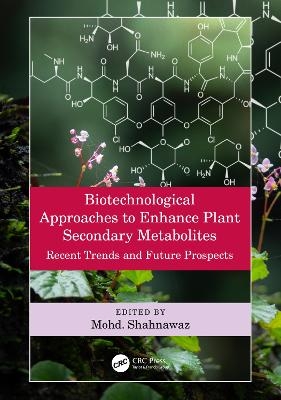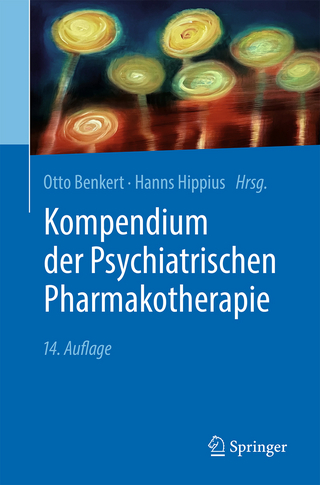
Biotechnological Approaches to Enhance Plant Secondary Metabolites
CRC Press (Verlag)
978-0-367-47336-5 (ISBN)
Thousands of secondary metabolites are produced by plants to withstand unfavourable environmental conditions and are important molecules for nutraceutical, agro, cosmetic and pharmaceutical industries, etc. Harvesting of plants for the extraction of these important metabolites can threaten the plant germplasm, and various medicinally important plants are at the verge of extinction. Based on need, various methods and strategies were developed and followed by researchers from time to time to save the plant germplasm and produce important secondary metabolites efficiently to meet their growing demands.
Biotechnological Approaches to Enhance Plant Secondary Metabolites: Recent Trends and Future Prospects provides a comprehensive introduction and review of state-of-the-art biotechnological tools in this field of research at global level. The methodologies are highlighted by real data examples in both in vitro and in vivo level studies.
The book:
• Highlights and provides overviews of the synthesis, classification, biological function and medicinal applications of the recent advancements for the enhanced production of novel secondary metabolites in plants
• Provides an overview of the role of induced mutation, salinity stress and brassinosteroids impact to increase the secondary metabolic contents in plants and suggests an increase in enzymatic activity in plants could be due to various point mutations, which in turn could play a role at transcriptome levels
• Discusses the significant role of endophytes to enhance the contents of plant secondary metabolites
• Alternatively, suggests the urgent need to set up the standard operating procedures using hydroponics system of cultivation for significant enhancement of secondary metabolite contents
• Enlists various in vitro techniques to enhance plant secondary metabolites contents using plant tissue culture approaches
• Provides a systematic overview of state-of-the-art biotechnological tools CRISPER Cas9 and RNAi to enhance the plant secondary metabolite contents
• Recommends CRISPER Cas9 technology over RNAi, ZFNs and TALENs because of its relatively simple and high precision method with an easily programmable tool
This serves as a reference book for the researchers working in the field of plant secondary metabolites and pharmaceutical industries at global level.
Dr. Mohd. Shahnawaz is currently working as a Lecturer at the Department of Botany, Govt. Degree College Paloura, Mishriwala, Jammu and Kashmir, India, on an academic arrangement basis. He has completed his post-doctoral research (funded by DST-SERB, Govt. of India) from the Plant Biotechnology Division, CSIR-Indian Institute of Integrative Medicine, Jammu & Kashmir, India. He worked to enhance the contents of secondary metabolites in Coleus forskohli using in vitro salinity stress. Previously, he has worked as a Lecturer in Botany at the Department of Botany, Govt. Degree College Kishtwar, Jammu and Kashmir, India (2016-2017) on an academic arrangement basis. He has earned his M. Phil. and Ph. D. in Botany from the Department of Botany, Savitribai Phule Pune University, Maharashtra, India under the guidance of Prof. A. B. Nadaf and Prof. A. B. Ade in 2010 and 2016. He is the recipient of various fellowships awarded by the Savitribai Phule Pune University, University Grants Commission (UGC), and Department of Science and Technology (DST)-Science Engineering and Research Board (SERB), India. His research interests are focused on ecology, microbiology, bioremediation, and plant biotechnology. He has served as a referee and editorial board member of various journals of International repute. In 2019, he was awarded the Young Scientist Award by VDGOOD Professional Associations, Vishakhapatnam, India. Till now, he has published more than 20 research articles in peer-reviewed international journals and authored 6 books. Previously he had served as an Academic Editor of the Asian Journal of Biology (SCIENCE DOMAIN international).
Chapter 1 Plant Secondary Metabolites—The Key Drivers of Plant’s Defence Mechanisms: A General Introduction
D. Sruthi and C. Jayabaskaran
Chapter 2 Generation of Plant Mutant Lines Using Gamma Radiation with Enhanced Secondary Metabolite Contents
Lata I. Shukla, P. Vivek Vardhan, T. K. Devika, Sayan Roy and Sourav Bhatacharya
Chapter 3 Salinity Stress and Plant Secondary Metabolite Enhancement: An Overview
Bedabrata Saha, Bhaben Chowardhara, Jay Prakash Awasthi, Sanjib Kumar Panda and Kishore C.S. Panigrahi
Chapter 4 Enhancement of Plant Secondary Metabolites Using Fungal Endophytes
Touseef Hussain, Mulla Javed, Samrin Shaikh, Bilquees Tabasum, Kashif Hussain, Moh Sajid Ansari, Amir Khan and Abrar Ahmad Khan
Chapter 5 Hydroponic Cultivation Approaches to Enhance the Contents of the Secondary Metabolites in Plants
Yogesh Chandrakant Suryawanshi
Chapter 6 Tissue Culture Approaches to Enhance Plant Secondary Metabolites Production
Vishal N. Patil and Mohd. Shahnawaz
Chapter 7 Hairy Roots and Plant Secondary Metabolites Production: An Update
Sharada L. Deore, Bhushan A. Baviskar and Anjali A. Kide
Chapter 8 Brassinosteroids: The Phytohormones with Potential to Enhance the Secondary Metabolite Production in Plants
Barket Ali, Zahoor A. Wani and Mudasir Irfan Dar
Chapter 9 CRISPR-Cas9 Approaches to Enhance Contents of Plant Secondary Metabolites
Riddhi Rajyaguru, Nataraja Maheshala, Chandrashekar Mootapally, Neelam Nathani, Rukamsingh Tomar, Hiren Bhalani and Priyanka Sharma
Chapter 10 RNA Interference for Improvement of Secondary Metabolite Production in Plants
Ashutosh Kumar Rai and Pramod Wasudeo Ramteke
| Erscheinungsdatum | 08.11.2021 |
|---|---|
| Zusatzinfo | 18 Tables, black and white; 18 Line drawings, color; 12 Line drawings, black and white; 1 Halftones, color; 1 Halftones, black and white; 19 Illustrations, color; 13 Illustrations, black and white |
| Verlagsort | London |
| Sprache | englisch |
| Maße | 178 x 254 mm |
| Gewicht | 521 g |
| Themenwelt | Medizin / Pharmazie ► Medizinische Fachgebiete ► Pharmakologie / Pharmakotherapie |
| Naturwissenschaften ► Biologie | |
| Technik ► Umwelttechnik / Biotechnologie | |
| Weitere Fachgebiete ► Land- / Forstwirtschaft / Fischerei | |
| ISBN-10 | 0-367-47336-4 / 0367473364 |
| ISBN-13 | 978-0-367-47336-5 / 9780367473365 |
| Zustand | Neuware |
| Haben Sie eine Frage zum Produkt? |
aus dem Bereich


